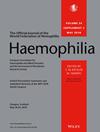Challenges in the diagnosis and management of patients with rare coagulation disorders in Lebanon and consequences of a social and economic crisis
Abstract
Introduction
Rare coagulation disorders (RCDs) constitute an important health risk. Data on epidemiology, quality of life (QoL), access to care, and impact of the ongoing economic crisis on RCDs in Lebanon is limited.
Aim
We aimed to address these gaps by evaluating effect of the crisis on the management of RCDs.
Methods
We performed a retrospective chart review of RCD pediatric patients in a tertiary hospital between 2003 and 2023. Patients with deficiencies of fibrinogen, factor (F)II, FV, combined FV and FVIII, FVII, FXI, FXII, FXIII, and congenital deficiency of vitamin K-dependent factors (VKCFDs) underwent a qualitative assessment of the impact of the economic crisis on care and quality of life by an interview aimed at investigating obstacles to diagnosis, disparities in access to treatment, impact of the crisis on QoL and disease management, and opinion on governmental efforts to solve the health crisis.
Results
46 patients were included. The response rate for the interview was 63%. Among the cohort, 21 (72.4%) reported difficulty accessing treatment since the start of the crisis and 18 (62%) reported “lack of healthcare coverage for necessary treatments” as the main issue. Most participants reported that the Lebanese government did not adequately address their needs during the crisis.
Conclusion
Our study showcased that management of RCD patients in Lebanon has been severely affected by the economic crisis. Combined efforts by public and private sectors are needed to appropriately address this issue. Lessons can be learned from the Lebanese experience to appropriately screen for actionable factors in vulnerable populations.

 求助内容:
求助内容: 应助结果提醒方式:
应助结果提醒方式:


